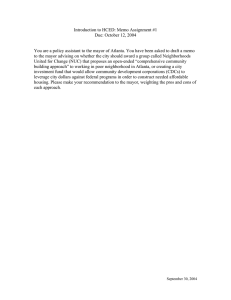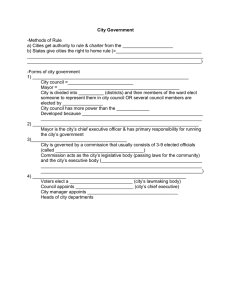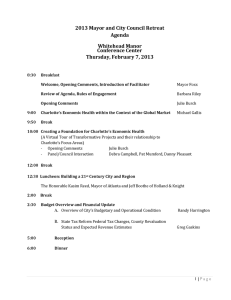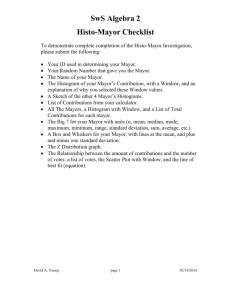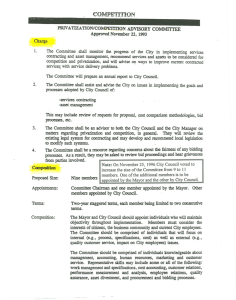MEMO
advertisement
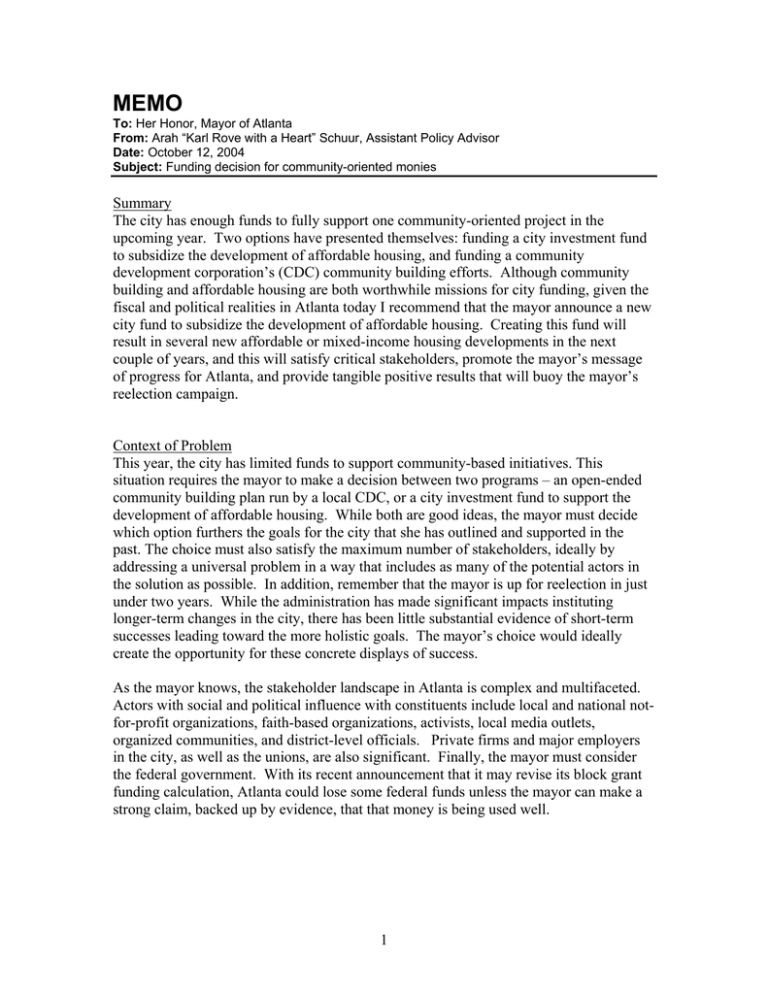
MEMO To: Her Honor, Mayor of Atlanta From: Arah “Karl Rove with a Heart” Schuur, Assistant Policy Advisor Date: October 12, 2004 Subject: Funding decision for community-oriented monies Summary The city has enough funds to fully support one community-oriented project in the upcoming year. Two options have presented themselves: funding a city investment fund to subsidize the development of affordable housing, and funding a community development corporation’s (CDC) community building efforts. Although community building and affordable housing are both worthwhile missions for city funding, given the fiscal and political realities in Atlanta today I recommend that the mayor announce a new city fund to subsidize the development of affordable housing. Creating this fund will result in several new affordable or mixed-income housing developments in the next couple of years, and this will satisfy critical stakeholders, promote the mayor’s message of progress for Atlanta, and provide tangible positive results that will buoy the mayor’s reelection campaign. Context of Problem This year, the city has limited funds to support community-based initiatives. This situation requires the mayor to make a decision between two programs – an open-ended community building plan run by a local CDC, or a city investment fund to support the development of affordable housing. While both are good ideas, the mayor must decide which option furthers the goals for the city that she has outlined and supported in the past. The choice must also satisfy the maximum number of stakeholders, ideally by addressing a universal problem in a way that includes as many of the potential actors in the solution as possible. In addition, remember that the mayor is up for reelection in just under two years. While the administration has made significant impacts instituting longer-term changes in the city, there has been little substantial evidence of short-term successes leading toward the more holistic goals. The mayor’s choice would ideally create the opportunity for these concrete displays of success. As the mayor knows, the stakeholder landscape in Atlanta is complex and multifaceted. Actors with social and political influence with constituents include local and national notfor-profit organizations, faith-based organizations, activists, local media outlets, organized communities, and district-level officials. Private firms and major employers in the city, as well as the unions, are also significant. Finally, the mayor must consider the federal government. With its recent announcement that it may revise its block grant funding calculation, Atlanta could lose some federal funds unless the mayor can make a strong claim, backed up by evidence, that that money is being used well. 1 Funding Options The mayor has two options for next year’s community-oriented funds. Community Building One of Atlanta’s neighborhood-based CDCs, Neighborhoods United for Change (NUC), has approached the administration requesting funding for its comprehensive community building efforts. While there are many definitions of community building, a general one is “…building community in individual neighborhoods: neighbors learning to rely on each other, working together on concrete tasks that take advantage of new self-awareness of their collective and individual assets and, in the process, creating human, family, and social capital that provides a new base for a more promising future and reconnection to America’s mainstream.”1 If this definition seems vague, it is. In fact, this is the very nature of open-ended community building – the organizers take direction from the community, and the community sets priorities and goals. In the case under consideration, NUC is unable to pinpoint what direction their efforts will take. Funding this initiative would require supporting the process itself without any control over or commitment to end results. It is even possible that the end results would be negative to the mayor’s administration, and would result in protest, negative press, and a degraded relationship with this and other neighborhoods. Community building is also a slow, incremental process in which trust and communication is established over time and goals are determined gradually. In fact, one researcher notes, “Community building tends to build neighborhood capacity in increments. Supporters need to recognize that such a process will take time and that, in any neighborhood, there will be setbacks.” (Kingsley, et al, p.12) and another claims “Analysts have yet to produce scientific evidence about whether these [community building] strategies “work” in terms of measurable outcomes.”2 Again, while supporting community building is a critical position for the mayor, I believe that NUC’s program is not the best choice for city funding. The long timeframe and lack of short-term results will be detrimental to the mayor’s record. In another year, when the same funding decision needs to be made, NUC’s efforts may have little or no specific results, and when the mayoral reelection campaign starts in less than two years, this program most likely would not have any concrete evidence of success. Finally, NUC represents only one of the numerous neighborhoods in the mayor’s jurisdiction. I believe that using the city’s entire allocation of community-based funds on NUC will engender more conflict among the stakeholders than good will. Empowering neighborhoods is an important goal. Communities with capital (social, physical, political, etc.) are communities that are focused in their needs and competent in 1 Thomas Kingsley, et al, Community Building Comes of Age, Urban Institute, 1997, p.3 O’Connor, Alice, Evaluating Comprehensive Community Initiatives: A View from History, from New Approaches to Evaluating Community Initiatives: Concepts, Methods, and Contexts, Aspen Institute for Human Studies, 1999, p. 56 2 2 their interaction with the city and state. I believe that this administration should foster community-building efforts with manpower, fundraising assistance, and a public show of support, but I do not think that the NUC program is the best use of this year’s limited dollars. Housing Fund It is commonly acknowledged that Atlanta’s housing affordability problem is one of the most pressing issues facing the city today. The high cost of housing prevents lower-wage workers from living in the city, makes it difficult for young workers and families to settle in the city, and impacts the ability of local firms to attract out-of-state workers. With the administration’s successful economic development programs, Atlanta’s neighborhoods are becoming more appealing, and thus more expensive, than ever. In order to reduce the cost of housing, the mayor must take measures to increase the supply of housing by spurring new development. A city-subsidized fund would achieve this goal by leveraging fiscal resources provided by the federal government for the creation of housing, dollars that the city is not utilizing today. Unlike community building, subsidizing housing development creates tangible, shortterm results. “Housing investments had direct payoff…housing activities produced visible change that a CDCs believed would help build a community’s confidence to confront other issues.”3 Every project that includes permanently affordable units serves as a quantitative measure of progress toward one of the administration’s goals. Not only do these numbers serve well in promoting the mayor’s current stated goals for the city and reelection promises, but the mayor can also make an appearance at each ribbon cutting, garnering media coverage and a chance to meet and impress constituents. Affordable housing enjoys broad-based and widespread popularity. Boston’s Mayor Thomas Menino has earned the moniker “The Housing Mayor” for his well-planned and multi-pronged strategy to address housing affordability. He is asked to speak around the country about his housing programs. During the Democratic convention, national politicians and social activists were taken on tours of some city-funded housing developments. This is not only good for the reputation of the mayor; it’s also good for the city. Housing is also a (relatively) easy way to address a city’s problems. Supporting affordable housing development addresses a universal problem in a way that allows the market to play a role and a varied spectrum of stakeholders to benefit. While some critics may claim that the mayor chose the safe, uncreative option to fund, I believe that involving stakeholders in the planning and competition for development subsidies will create good will for the program and the administration. Housing affordability is an issue that affects many of the organizations in this city, and a strong plan to address the affordability problem will attract supporters as diverse as CDCs with the capacity to develop, private firms in need of worker housing, for-profit developers interested in taking advantage of subsidies, mental health organizations, senior advocates and the 3 Walker & Weinheimer, Community Development in the 1990s, Urban Institute, 1998, p.17 3 faith-based community. For example, the area that NUC represents faces one of the most severe shortages of affordable housing in the city. The administration should reach out to this community, using NUC as an intermediary, and encourage the neighborhood to set priorities and NUC to apply for funds to develop new housing. Implementation Another benefit of a housing fund is that there are many examples of this kind of program in cities around the country that Atlanta can use to design its implementation strategy. In planning for implementation, the goals are: • Fast and efficient use of the funds in order to start creating units in the short-term • Proactive planning and inclusion of key stakeholders in order to build broadbased support for the program To this end, I recommend the following steps to implementation: • Determine the amount of affordable units that is the stated goal of the fund • Determine the amount of funding available, the mechanism for application and the details of the program • Meet with key stakeholders, including NUC and other neighborhood-based organizations to explain the program and elicit their support • Announce the fund Conclusion In reviewing the two choices for city funds for this year, I believe that the housing fund emerges as the clear stronger option. While community building is an important aspect of strengthening the fabric of a city, it is not a strategy that produces the kind of results in the timeframe that is required for public funding. The loose goals and extended timeframe of community will certainly aggravate some of the mayor’s constituents and key supporters and financing one neighborhood’s program will alienate others. As the mayor approaches the start of the reelection campaign, she will benefit by having some specific successes to champion. New affordable housing development provides that quantitative, tangible result. Finally, housing affordability is an issue that cuts across geographic, cultural, and organizational lines, and development is something in which many communities, organizations and firms can participate. In conclusion, I believe that creating a housing fund is a better way to showcase the mayor’s accomplishments, a better way for a wide range of stakeholders to benefit, and is a higher priority for the city of Atlanta. 4
